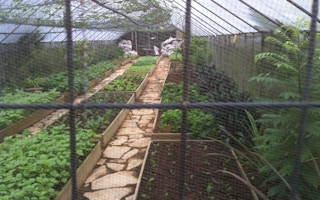With land in short supply, green-fingered Singaporeans are renting plots from farms so they can grow their own vegetables.
At least three farms here allow locals to do this, and charge between $250 and $1,000 per month for land plots ranging from 700 to 7,000 sq ft. Waiting lists can stretch up to four years.
“No one wants to give up their plot so the waiting list is about three pages long now,” said Madam Lynn Lee, 55, who has adopted two plots from Green Valley Farms in Bah Soon Pah Road in Khatib.
Since the farm opened up a quarter of its 6.9ha land area for people to farm in 2003, its tenants have risen from six a decade ago to close to 30 now.
The appeal of urban farming lies in the growing appetite for organic produce. Others see it as a form of recreation that allows them to escape the crowded city and its hectic pace of life.
“No pesticides are used and the vegetables are sweeter and crunchier. I frequent the supermarkets less now,” said Mr Roy Tong, 59, an insurance agent.
His flexible work schedule allows him to swing by his plot of land for a few hours every day to tend to his crops, which include chye sim, long beans and lettuce.
For Mr Lim Shun He, 77, farming takes him back to his childhood days of living in a kampung in Mandai. “Most of what I know, I learnt from my parents,” said the retired factory worker.
In response to an increasing number of residents who wish to grow vegetables at home, the Agri-Food and Veterinary Authority (AVA) recently came up with a space-saving way of cultivating vegetables vertically.
The system, named Veggie Pipe, uses PVC pipes commonly used to carry sewage and water. The pipes can be bought from hardware stores. When they are stacked together to form a vertical structure, they can be mounted onto walls.
Yet, spaces at home - whether it is the rooftop, balcony or backyard - often prove insufficient.
“Here, there is enough space for me to plant five or six types of vegetables,” said Mr Richard Goh, 62, a businessman. He harvests about 30kg of vegetables, including long beans and lady’s fingers, every two weeks from his 1,000 sq ft plot.
Others take to farming to sustain a healthy lifestyle.
“Instead of going to expensive gyms or spas to detox, I come here for my exercise and my frozen shoulders have gotten better,” said Madam Lee.
Vegetable supplier Zhang Aimin, 52, sensed the demand for healthier vegetables after his customers complained of allergies from eating pesticide-laced vegetables. After a fruitless four-year wait for a land plot to become available at Green Valley, Mr Zhang applied to the authorities for a piece of land in Lim Chu Kang in July last year.
He received the green light early this year and is currently doing up 140 plots of land, each roughly 700 sq ft. He intends to give up about half for adoption to other organic farming enthusiasts.
His farm, Sky and Land Organic Agriculture, is the new kid on the block. Green Valley started opening up its land for adoption in 2003 while farm resort D’Kranji did so in 2008.
The only catch so far is licensing. Under their lease conditions, farms which wish to sublet their land are required to obtain approval from the Singapore Land Authority (SLA).
As part of the evaluation, the SLA will consult the AVA, which licenses farms in Singapore. This is to ensure that the farming activities comply with AVA’s bio-safety and bio-security requirements.
For now, there are signs that this activity is taking root - even among the young.
Mr Tay Lai Hock, founder of local environmental group Ground-Up Initiative, said he has been approached by more young people who want to find out how to set up their own food gardens.
He added: “I hope it is not just a fad as urban farming allows people to appreciate the beauty of nature.”








